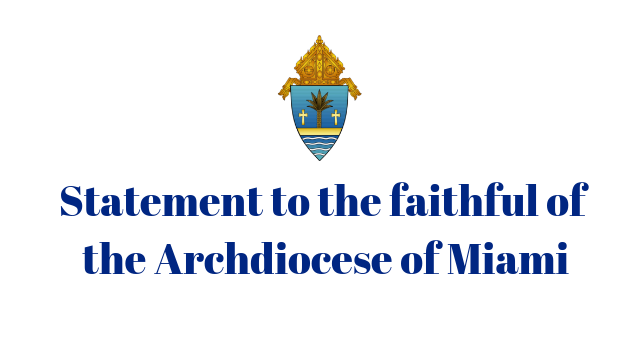By Archbishop Thomas Wenski - The Archdiocese of Miami

“As each one has received a gift, use it to serve one another as good stewards of God’s varied grace.” 1 Peter 4:10
Dear members of Christ’s faithful in this local Church of Miami, I wish to share with you some reflections on stewardship. A proper understanding of our role as “stewards of God’s varied grace” can help us truly be “missionary disciples.”
Made in His own image and likeness, God made us for Himself and in his plan; he has made us stewards of his creation that we might respond to his love in kind so that, cooperating with him, we use our gifts for his greater honor and glory.
Stewardship — placing our time, talent and treasure at his disposal — is then the path of discipleship by which we grow in our friendship with God, and with one another, becoming in Christ, through the gift of the Holy Spirit, the persons that God meant for us to be.
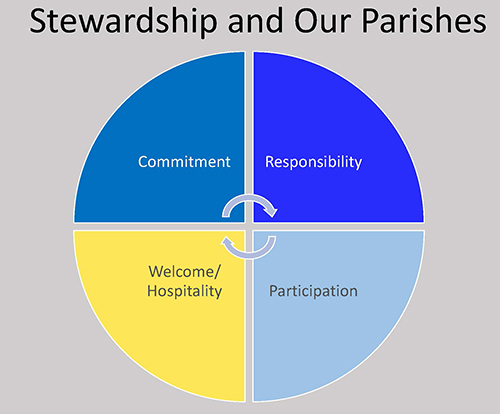
Of course, in inviting us to “come, follow him,” Jesus calls us to walk the “narrow path.” As we make our life’s pilgrimage through this “vale of tears,” this path will take us by the Way of the Cross, the way of Jesus who sacrificed himself for us and for our salvation. In fact, the Bishops at the Second Vatican Council insisted that as human beings we can only fully realize ourselves through the sincere gift of ourselves in imitation of Christ.
Seen in this way, stewardship is not just a “program” to increase the Sunday offertory. It is really something much more demanding. More than a “fundraising” gimmick, stewardship rightly understood is a way of life. So, it is something much more difficult than just writing a check. Becoming a disciple of Jesus Christ, given our fallen human nature, goes against the grain of our propensity for self-seeking, self-assertion and self-realization. (Isn’t the multiplication of warehouses that rent space for “self-storage” a sad commentary on our culture of acquisitiveness?)
But a good steward accepts joyfully the risks of discipleship. To be a friend of Jesus calls us to “come out of ourselves.” However, this is not a burden imposed upon us. To be a Christian is far from being a burden, it is a gift — and, to follow Christ, offering him in return our own gifts of time, talent and treasure, brings us joy, a joy that gives meaning and direction to our lives.
In that sense, stewardship is not all about money. But our money — and the way we use it and how we use our time and talents — is all about stewardship. To say that we are “stewards” is to say that we are not the “owners” of our time, talent or our treasure.
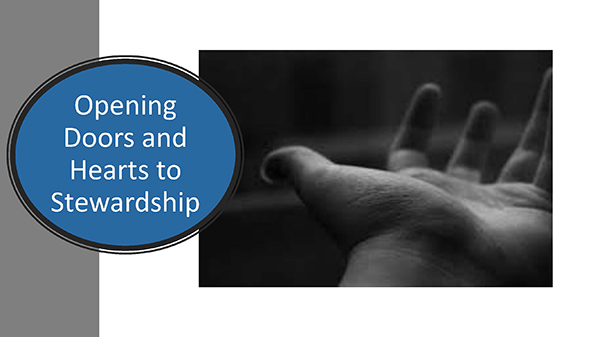
The only things we can rightly claim as our own are our sins. Everything else we have received from others. What we have, we have received freely from our parents, our families and from those who have mentored us and afforded us so many opportunities. Ultimately, all these gifts find their origin in God who is never outdone in generosity. But God does make us “managers” or “administrators” of what is his, to act on his behalf. God in his mercy still calls us despite our sinfulness into his vineyard to work to multiply the gifts he has given us. (cf. Matthew 25:21)
The use of the word “stewardship” became popular in Catholic circles when the bishops of the United States wrote in 1992 a pastoral letter entitled, Stewardship: a Disciple’s Response. The term itself is often difficult to translate. For example, in Spanish, it is translated variously as “mayordormía,” “administración” or “co-responsabilidad.” No matter how one might translate it, the bishops defined a Christian steward as “one who receives God’s gifts gratefully and cherishes and tends them in a responsible and accountable manner, sharing them in justice and love with others, returning them with increase to the Lord.”
When I was a student at Sacred Heart School in Lake Worth, Florida, where I grew up, the sisters had us write JMJ on all our papers and homework assignments. JMJ stood for Jesus, Mary and Joseph. The sisters wanted us to understand that everything we do should be a prayer — the lifting up of our minds and hearts to God — even homework, and so: JMJ, Jesus, Mary and Joseph. Likewise, stewardship is born of and sustained by prayer.
The sisters also had us write AMDG — Ad Majorem Dei Gloriam — for the Greater Glory of God. They also wanted us to give our best effort, because you don't give God much glory unless you give your very best.
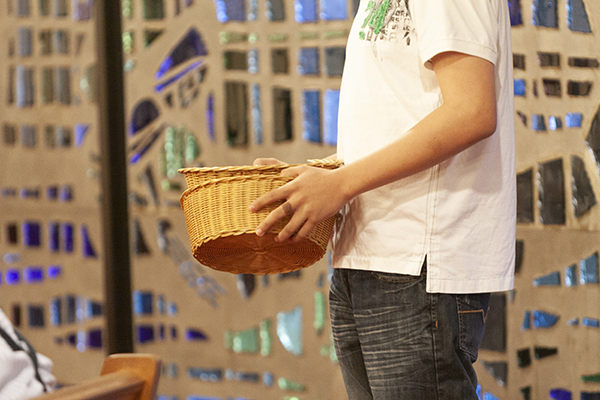
Photographer: ANA RODRIGUEZ-SOTO | FC
Ushers prepare to take up the offertory collection during a Mass in this file photo.
Incumbent on each one of us, then, is the need to be better disciples by growing in our personal, living relationship with Christ, and the need to be better missionaries by leading by example our fellow brothers and sisters to a new experience of holiness and abundant life in Christ. The good steward is a missionary disciple who shares God’s love, by selflessly contributing his or her time, talent and treasure, and in doing so offers a future of hope to all, especially to those most in need. Stewardship calls us to be both committed disciples and coherent missionaries, accountable to the Lord for the gifts he has given us. As stewards, we share what we have experienced in the lived intimacy of our communion with Christ so that others may experience the joy of knowing him.
As Teresa of Avila said, “Christ has no body now but yours.” Today, it is through our eyes that Christ looks with compassion on this world; it with our feet that he walks to do good, with our hands that he blesses the entire world.
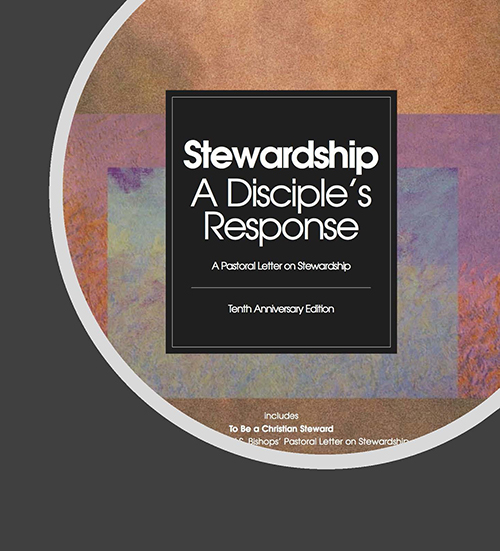
The use of the word “stewardship” became popular in Catholic circles when the bishops of the United States wrote in 1992 a pastoral letter entitled, Stewardship: a Disciple’s Response.
In conclusion, if we think of stewardship as being about an annual local fundraiser or a tithing program, we sell it, and ourselves, short. Stewardship would then become a burden rather than helping us to discover the joy of giving, which again in the words of the Fathers of the Second Vatican Council, is the way, the only way, we will realize ourselves fully as human beings and thus respond to our baptismal vocation to holiness by becoming the people God meant us to be.
In the end, to be a Christian is not a burden, it is a gift; and to know Jesus Christ is the best thing that has ever happened to us; and using our time, talent and treasure to share him with others is a joy. Recalling again the words of St. Peter, consider the gifts you have received from God, and prayerfully discern how you as a missionary disciple use your gifts of time, talent and treasure to advance the mission of our Church.
I pray that your experience of stewardship will be, for you, a joy, a grace, a treasure received and shared.
Yours in Christ,
Archbishop Thomas Wenski
